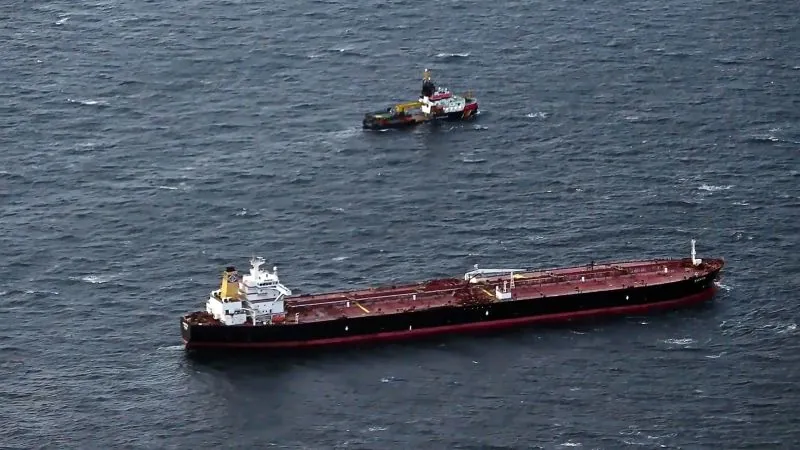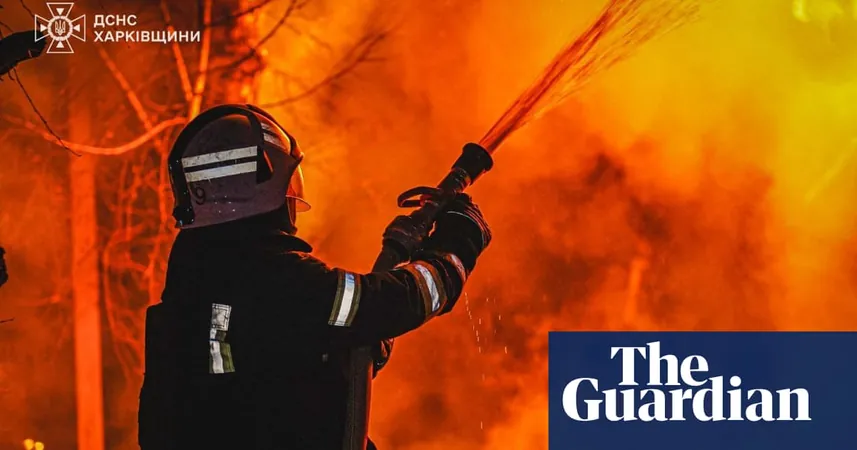
Germany Intervenes to Secure Disabled Russian Oil Tanker in the Baltic Sea
2025-01-11
Author: Jessica Wong
Germany Takes Action on Drifting Oil Tanker
Germany is taking decisive action to secure a drifting Russian oil tanker, identified as part of Moscow’s controversial 'shadow fleet' which is believed to fund its ongoing war efforts in Ukraine. The Eventin tanker, laden with nearly 100,000 tons of oil suspected to be of Russian origin, lost power off the coast of the German island of Rügen.
Distress Conditions and Towing Efforts
According to Germany’s Central Command for Maritime Emergencies (CCME), the Eventin encountered distress conditions on Friday. Three tugboats were dispatched on Saturday to tow the 274-meter-long Panamanian-flagged tanker to safety. The vessel had departed from Russia and was en route to Egypt, as per tracking data from MarineTraffic.
Weather Challenges and Security Concerns
German officials reported that the convoy's progress was hampered by stormy weather, making the towing process notably slow. German Foreign Minister Annalena Baerbock condemned the aging oil tanker as a symbol of the security challenges posed by Russia to Europe. She emphasized the unscrupulous tactics employed by Russian President Vladimir Putin in bypassing international sanctions through the use of obsolete tankers, which significantly threaten both maritime safety and environmental integrity in the region.
The Shadow Fleet and Environmental Risks
The reliance on this so-called 'shadow fleet' — primarily composed of outdated and often uninsured vessels — has amplified concerns among Western nations, particularly as these ships have been linked to severe environmental incidents, including spills in both the Black Sea and critical undersea cables in the Baltic Sea. In December alone, two decrepit Russian tankers sank off the coast of Crimea, discharging thousands of tons of fuel, prompting strong condemnation from Ukrainian President Volodymyr Zelensky.
Ukrainian Condemnation and Global Sanctions
Zelensky also lashed out on Friday, referring to the Eventin as an 'oil bomb' and highlighting the broader implications of Russia's actions. “Every day, Russia bombards Ukraine,” he lamented, “and it finances its missiles, strike drones, and bombs in part with profits from its tanker fleet.”
U.S. Sanctions and G7 Price Cap
In light of these developments, the Biden administration, on its way out, enforced stringent sanctions targeting Russia’s energy sector and its shadow fleet. These sweeping measures aim to impact nearly 200 oil-carrying vessels believed to contribute to the Kremlin’s war funding. Analysts predict these restrictions could cost Russia billions of dollars each month, crucial income that would otherwise support its military operations.
The Broader Implications
The Group of Seven (G7) nations previously established a price cap on Russian oil at $60 per barrel in December 2022. This price ceiling is designed to be enforced through shipping and insurance companies and has led to Russia using older, less-reliable tankers, which are often flagged in countries that do not comply with G7 sanctions.
Rising Concerns About Maritime Safety
Recent reports from the Centre for Research on Energy and Clean Air (CREA) highlighted that in the last month alone, 420 vessels were involved in exporting Russian crude, with 234 classified as shadow tankers. Alarmingly, around 30% of these vessels are over two decades old, raising significant concerns regarding both the safety and environmental implications of their continued operation.
Conclusion
As Germany continues to navigate the complexities of this maritime emergency, international scrutiny regarding Russia’s maritime operations is likely to intensify, shining a light on the broader consequences of the shadow fleet in the ongoing conflict.




 Brasil (PT)
Brasil (PT)
 Canada (EN)
Canada (EN)
 Chile (ES)
Chile (ES)
 Česko (CS)
Česko (CS)
 대한민국 (KO)
대한민국 (KO)
 España (ES)
España (ES)
 France (FR)
France (FR)
 Hong Kong (EN)
Hong Kong (EN)
 Italia (IT)
Italia (IT)
 日本 (JA)
日本 (JA)
 Magyarország (HU)
Magyarország (HU)
 Norge (NO)
Norge (NO)
 Polska (PL)
Polska (PL)
 Schweiz (DE)
Schweiz (DE)
 Singapore (EN)
Singapore (EN)
 Sverige (SV)
Sverige (SV)
 Suomi (FI)
Suomi (FI)
 Türkiye (TR)
Türkiye (TR)
 الإمارات العربية المتحدة (AR)
الإمارات العربية المتحدة (AR)